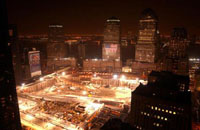Iran's president not allowed to lay wreath at ground zero

Iran ’s president has expressed the will to lay a wreath at the World Trade Center site in New York City next week, but police denied. The U.S. diplomats considered it as an attempt to turn ground zero into a "photo op."
Mahmoud Ahmadinejad, who is to arrive Sunday to address the U.N.'s General Assembly, asked the city and the U.S. Secret Service earlier this month for permission to visit the site of the Sept. 11, 2001, attacks.
The request to enter the fenced-in site was rejected because of ongoing construction there and due to security concerns, police spokesman Paul Browne said Wednesday.
White House spokesman Gordon Johndroe said a visit to ground zero "is a matter for the city of New York, but it seems more than odd that the president of a country that is a state sponsor of terror would visit ground zero."
Mohammad Mir Ali Mohammadi, spokesman for the Iranian mission to the U.N., said he was not notified officially that Ahmadinejad would not be allowed at the site, but said it was unfortunate.
"President Ahmadinejad intended to lay a wreath at the site of ground zero in order to pay tribute to the victims of the terrorists attack of Sept. 11, 2001. We are hopeful that we can still work something out with the police department," he said.
Police Commissioner Raymond Kelly said Wednesday the city was considering Ahmadinejad's application, prompting an outcry from politicians and families of Sept. 11 victims. Browne said about two hours later that Kelly had misspoken.
Port Authority and police representatives decided at a meeting that no dignitaries would be allowed inside the site, said Port Authority spokesman Steve Coleman.
The United States, its European allies and other world powers suspect Iranian authorities of seeking nuclear weapons, although Iran insists its uranium enrichment program and other atomic activities are aimed only at producing energy.
The U.S. ambassador to the United Nations, Zalmay Khalilzad, told reporters Wednesday that the United States would not support Iran's attempt to use the site for a "photo op."
"Iran can demonstrate its seriousness about concern with regard to terrorism by taking concrete actions," such as suspending its uranium enrichment program and dropping support for Lebanese militant group Hezbollah, Khalilzad said.
It was not clear whether Ahmadinejad wanted to descend to the base of the trade center site, where the fallen twin towers stood, or to lay a wreath on a public sidewalk outside the site.
Iran and the U.S. have not had diplomatic relations since 1979, when Washington cut its ties with Tehran after Iranian students stormed the U.S. Embassy in Tehran. The Bush administration has accused Iran of arming Shiite Muslim militants in Iraq and seeking to develop nuclear weapons.
In a television appearance earlier this week, Ahmadinejad said his country wanted peace and friendship with the United States, despite mounting tensions between the two countries.
In a related development, the U.S. also denied a visa to Iran's United Nations ambassador in Geneva to attend next week's General Assembly meeting because he was involved in the 1979 U.S. hostage crisis, a U.N. official said.
It was not clear what role the ambassador, Ali Reza Moaiyeri, allegedly played in the hostage drama. The U.N. official who said his visa was denied spoke on condition of anonymity because there has been no public announcement.
Richard Grenell, spokesman for the U.S. Mission to the United Nations, said, "although we don't comment about specific visa cases we certainly would not allow a person into the United States who has taken Americans as hostages."
Subscribe to Pravda.Ru Telegram channel, Facebook, RSS!


